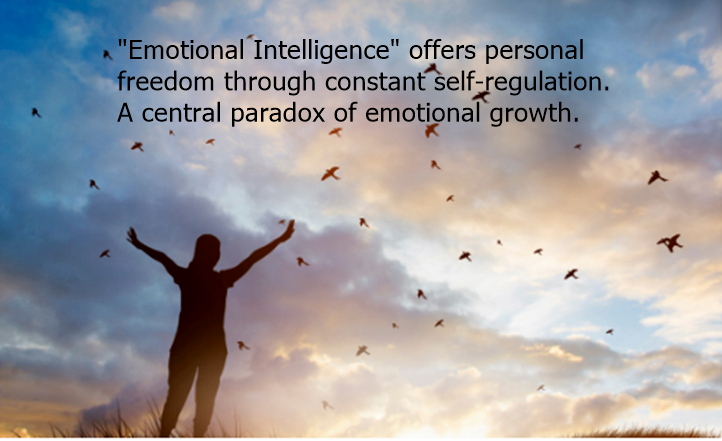"Emotional Intelligence" offers personal freedom

By ChatGPT4o- Tome - Human Synthesis - 04 Sp. 2024
"Emotional Intelligence" offers personal freedom through constant self-regulation captures a central paradox of emotional growth. Emotional intelligence (EQ) emphasizes understanding and managing one's own emotions and responding thoughtfully to the emotions of others. In this framework, personal freedom arises not from indulging every impulse, but from mastering self-regulation.
This self-regulation leads to a kind of freedom because, rather than being controlled by fleeting emotions or external pressures, individuals can respond deliberately and wisely to life's challenges. Through this conscious control, they maintain inner balance, make better decisions, and cultivate more meaningful relationships. Instead of being reactive, they're proactive in shaping their emotional world, which fosters a sense of autonomy and empowerment.
In essence, emotional intelligence teaches that true freedom is found not in escaping discipline, but in mastering it.
Building on this idea, the paradox of emotional intelligence is that self-regulation—a seemingly restrictive practice—actually creates the space for deeper personal freedom. By consistently managing our emotional responses, we free ourselves from being at the mercy of automatic reactions, stress, or impulsive decisions that can often lead to negative outcomes.
This kind of self-regulation involves:
Awareness: Recognizing and understanding your emotional triggers.
Control: Not suppressing emotions, but rather acknowledging them and choosing how to respond.
Adaptability: Being flexible in changing emotional states, allowing for resilience in the face of challenges.
Empathy: Understanding others' emotions and responding in a way that nurtures positive interactions.
By mastering these skills, individuals gain the freedom to act with clarity rather than impulsivity, to choose how they experience emotions rather than being overwhelmed by them. It opens the possibility of navigating life with calm, thoughtful responses, and avoiding behaviors or choices that may lead to regret.
Thus, the paradoxical freedom of emotional intelligence is that by exercising continuous, mindful self-regulation, individuals gain greater control over their lives, relationships, and well-being. This form of freedom is empowering because it allows one to live with intention, aligned with personal values, rather than being swayed by external influences or temporary emotional states.
Philosophically, emotional intelligence suggests a form of freedom rooted in self-mastery rather than external liberation. This vision challenges traditional notions of freedom as merely the absence of constraints. Instead, it points to the idea that true autonomy is found within—through the cultivation of self-awareness, emotional discipline, and empathy.
By constantly practicing self-regulation, individuals transcend the immediate impulses that often govern behavior and attain a higher form of freedom: the ability to choose their responses and navigate life with intentionality. In this sense, emotional intelligence aligns with the Stoic ideal of freedom—liberation not from external conditions, but from the internal forces of unexamined emotions and desires.
This approach suggests that while external circumstances may be unpredictable and uncontrollable, the way we experience and respond to them is within our power. Therefore, the ultimate philosophical conclusion of emotional intelligence is that the greatest freedom lies not in escaping the world but in learning to master ourselves within it. This mastery grants us the agency to shape our lives with wisdom, purpose, and emotional clarity, resulting in a deeply rooted personal freedom that no external force can take away.
The End
